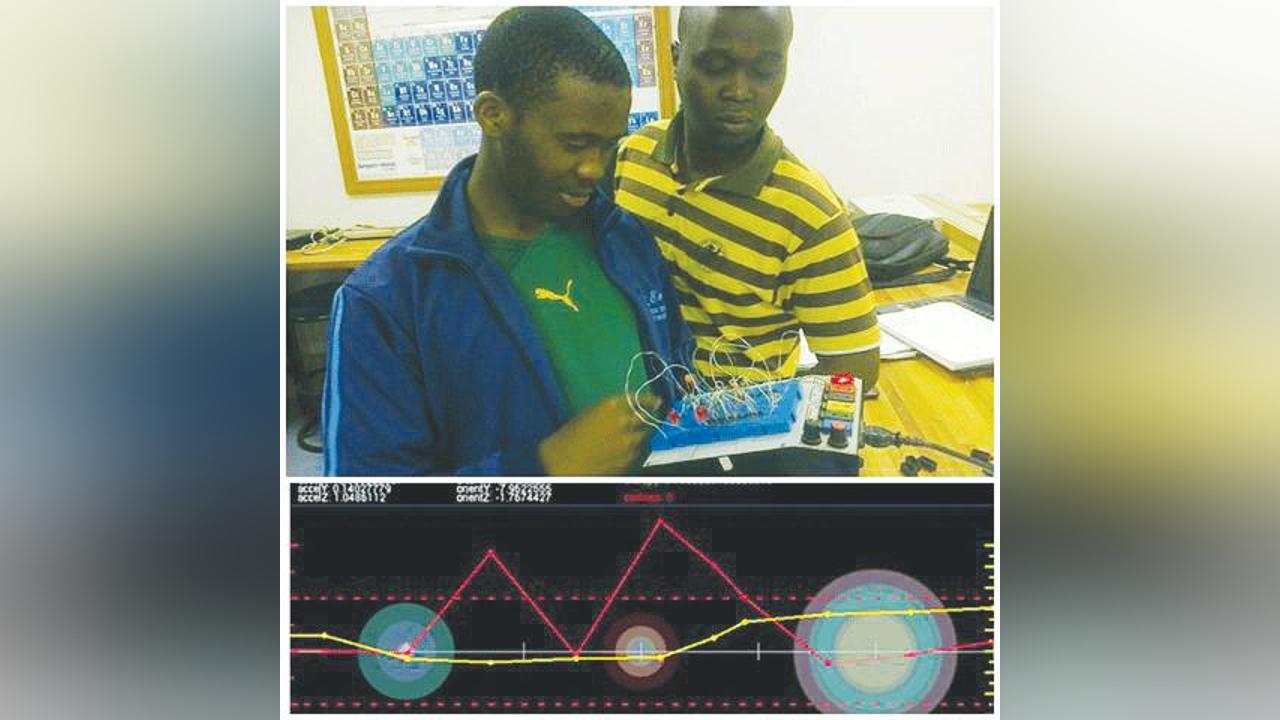Africa-Press – Lesotho. MOLEFI Makuebu, a National University of Lesotho (NUL) Computer Systems and Networks graduate, will assist in detecting potholes for speedy corrective action by relevant authorities. This is one of the winning projects of this year’s Vodacom Hackathon. The system works this way.
As your car speedily moves past a pothole, Makuebu’s app, installed in your cell-phone, detects it and immediately sends a location of the pothole to the server in the local traffic department.
This app “knows” the difference between a dangerous pothole and a minor bump. It will report only on potholes. Yet another driver comes in, plunges into the same pothole and the same thing happens.
In the end, the traffic department sees a pattern and rushes to fill the pothole. Makuebu entered the Vodacom Hackathon Competition with this app. The rest is history, as he joins a long queue of NUL young minds who have won the competition.
Again, thanks to the NUL whiz-kids, who would have thought that you could report a pothole to authorities without even thinking about it? Professor Nqosa Mahao, the NUL Vice Chancellor, drove this point home when he was quoted saying, “the NUL of today is not the NUL of old”.
He couldn’t have said it better. But let’s put things into context first. If you are a stranger to our local roads, you may have noticed something strange. Here is a line of three cars coming straight and speedily towards you—and goodness…they are on your lane!
Just when you think it may be you who is on the wrong lane, and you are about to jump to the other lane, then… thinkhoi! All three cars have pivoted to the other lane, their rightful lane—all in the speed of lightning! You are left flabbergasted! When you recover, you realize something.
They were running away from obscure things in their lane. Yes, those are the famous potholes in action. Unfortunately, it takes the locals to know where potholes are and to avoid them in the manner above.
For newcomers to the area, many just plunge into them, with serious consequences. In case you didn’t know this, potholes are no laughing matter. They can be disruptive at minimum and fatal at worst.
Makuebu knows this very well. Consider this. On the day of his graduation, the proud father of this smart NUL graduate made sure to buy a new wheel for his car to take his son and happy family to the Roma Valley and back.
On their way back, they plunged into a pothole and, wait for it… the new wheel was broken beyond repair. It could have been worse! But, at least, it was only the wheel!
For those who know Makuebu, he is not the one to stand by and watch as the potholes wreak havoc per their wish. So he plotted some revenge, a smart revenge.
“First I did some research and I found that the Ministry of Works was tasked with the job of creating and maintaining our national roads,” Makuebu said.
“As I did my research, I couldn’t help but marvel at the amounts of money involved in building roads, we talk millions, not thousands, in this arena.
” However, Makuebu’s curious mind noticed something else.
Yes the relevant Ministry is doing a sterling job in terms of the first mandate – that is building roads. When it comes to maintenance, he is not so sure.
So he resolved to help. He designed an automated system. When your car gets in contact with any lump on the road, the app in your cell-phone doesn’t automatically “think” it is a pothole.
Potholes have certain characteristics. Acceleration, orientation, bearing and entropy behave differently when it is a pothole. Makuebu calls these identities signatures.
“Potholes have signatures that are different from speed bumps, railroad tracks, bridge joints, manholes and so on.
” His app is able to identify these signatures and decide if something is a pothole or not, in a split second.
“This app depends on the presence of accelerometers and digital campus installed on the phone,’ Makuebu says.
“It also relies on Global Positioning System (GPS) to relay accurate information about the location of a pothole.
” What is the relationship between the app and the cell-phone accelerometer?
The app polls the accelerometer every 20 milliseconds, so it can’t miss pothole detection. Once pothole detection is triggered, the GPS sensor is queried for location.
Later, timestamp and device unique ID are compiled for report. Now good news! This is not your theoretical pothole detector. Makuebu has developed and used it and it works, just as planned.
The only difference is that the data is stored, not in the Ministry of Work’s server, not yet, but in the very cell-phone, his phone, that has detected the potholes. Sure you are thinking another alternative.
If you saw a pothole and avoided it, he is designing a system in which you will just stop by the side, click to identify the pothole location on your cell and, off you go, convinced that your request is received.
For More News And Analysis About Lesotho Follow Africa-Press






